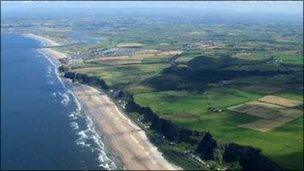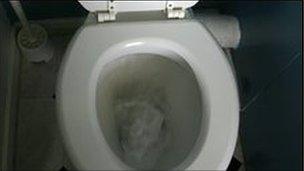Summit aims to help clean up NI's poor quality beaches
- Published

Ten of 24 Northern Ireland beaches were recommended for their excellent bathing water quality
Northern Ireland has had many summits but never a beach summit. I attended the first collective attempt to sort out the problem of poor quality beaches around parts of the Northern Irish coast.
Some of the beaches have been taking a severe pounding recently.
And it hasn't come from storm-driven waves. Just a handful of beaches were recommended for their excellent bathing water quality.
Only eight received a Blue Flag award this year.
The problem is that it has been the same story year after year and the situation is expected to get worse as the EU sets tougher criteria for beaches to meet.
Faced with this poor PR and the associated loss of potential earnings from tourism, the Northern Ireland environment minister Alex Attwood set up a good beach summit.
Key players from government, local councils and environment NGOs got round the table to discuss a way forward.
Pollution
Problems ranged from poor water quality to too much litter.
But an underlying problem was the haphazard way a beach could become polluted.
There are plenty of examples of beaches meeting excellent water standards for 363 days a year, but failing on two of the 20 days when test samples are taken.
That is enough to rob it of a blue flag.
As Mr Attwood explained, its not just about having nice beaches for the sake of it: "The natural environment - our beaches, mountains, rivers and lakes - are key components in the quality of our lives in creating jobs and attracting visitors.
"Making the most to protect and develop all of this is what the good beach summit is all about.
"Improving the natural environment, creating jobs and driving tourism is what Department of the Environment is all about, and is my ambition as minister.
"While Northern Ireland enjoys some excellent beaches and superb water quality, problems such as litter and sewage also exist."
Blocked sewers

Rubbish flushed down toilets can lead to blocked sewers which then overflows onto beaches
Not all the problems flow from elderly sewage systems.
It was revealed during the summit that although blocked sewers are a constant problem, the reason for the blockage is usually caused by rubbish being put down toilets in our homes.
Material that the pumps can't cope with eventually bring things to a halt.
The subsequent overflow of sewerage onto a beach can cost it a major annual award, but who is really to blame?
And how do you prevent a repeat of the incident.
As one person pointed out, cleaner beaches in Northern Ireland require something of a cultural change.
Dog fouling has increased on some beaches, along with litter from local sources.
It may not seem a major discovery, but for many it took the summit to expose the problem.
There is the big problem of agricultural run-off which is increasing.
And there is the unknown problem of thousands of septic tanks that don't work properly.
Unknown because no-one is really sure just how many there are.
Questions
Before 1972, they weren't always shown in plans so no-one is quite sure just how many exist.
Or just how many actually work.
This was a summit that threw up a lot of questions and not that many answers, yet.
So the minister has set a target of late September for a follow up with another summit to see what, if any, progress has been made.
All of this is overshadowed by the fact that within four years the standards by which beaches will be measured will increase sharply across Europe.
And no-one mentioned the M word, money.
Northern Ireland pays its water costs from domestic rates and general taxation.
There are no water charges and if the politicians have their way, there won't be any.
All of which may tie the hands of those who know what really has to be done, but just can't afford to do it.